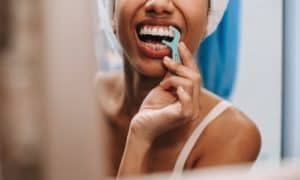
Fabulous Fruits
The USDA recommends that adults get two servings of fruit a day, the American Heart Association recommends four to five servings, and the CDC recommends 1-2 cups a day for kids, making fruit a pretty essential part of everyone’s diet. Fruits are packed with vitamins and can be an excellent snack. However, not all fruits are optimal in the same way, especially when it comes to oral health.
Sugars & Acids
Fruits are often considered a healthy treat. After all, they do contain plenty of vitamins, minerals, nutrients, and antioxidants. But when it comes to teeth, some fruits are better than others mainly because of the sugar or acid content. Sugars and acids can wreak havoc on tooth enamel and weaken it. Once the enamel erodes it can lead to several oral concerns, including an increased risk of decay. Keep an eye for the following signs of enamel erosion:
If you notice any symptoms of enamel erosion, contact your dentist in Canton.
What Fruit Can Help Teeth?
Now, we aren’t suggesting that you forego fruits. They are a necessary part of any healthy diet and their whole-health benefits are well worth it. However, when it comes to making choices that can be both good for your body and for your teeth, consider options that contain a lot of water such as:
Be Wary of These Fruits
Other types of fruit aren’t as good for teeth as others but may still provide necessary nutrients, so it’s important to find balance in what you eat. Some fruits that may be tougher on your teeth include:
Moderation is Key
As we’ve mentioned before, eating fruit is still an important part of making sure that your body gets all of the nutrients it needs. But your dentist in Canton would suggest enjoying fruits high in sugar or highly acidic in moderation, and even rinsing your mouth out with water when you’re done eating. Another important note that relates to juice, sipping fruit juice can expose your teeth to even more sugars and acids than whole, raw fruits. Whenever possible, choose natural fruits over juice.
Accepting new patients at our dental offices in Ann Arbor, Canton, Farmington Hills, and Livonia.

String Floss
Traditional string floss is economical and easy for most people to use. Dental hygienists explain that properly flossing with string floss requires the following steps:
Now, some dental professionals say that this flossing method is most effective at removing debris between the teeth and below the gum line. However, some people may find the instructions for string floss too complicated and may not be able to finesse the dexterity needed to properly clean their teeth. Those individuals may find a water flosser useful.
Water Flossers
Water flossers are an effective alternative to string floss, and the American Dental Hygienists’ Association recommends them as more effective than traditional floss. But there are some downsides. Water flossers are more expensive than string floss, can take some practice to get used to, and can take up space on your bathroom counter. However, a water flosser may be the right choice for people with arthritis, braces, or who have trouble maneuvering string floss. Additionally, water flossers may benefit anyone who has gum recession or sensitive teeth.
The Best Floss
No matter which type of floss you use, it’s important to do just that – use it! Flossing helps clean the parts of your teeth a toothbrush can’t reach. Your dentist in Ann Arbor recommends that everyone floss once a day, every day for optimal oral health.
If you have questions about which floss is right for you, talk with a dentist in Ann Arbor.
Welcoming new patients at our dental offices in Ann Arbor, Canton, Farmington Hills, and Livonia.

Common Reasons for Filling Pain
There are some reasons why a patient might have some discomfort after a dental treatment that can include:
Even if none of these apply to you and your oral health, there’s a chance you might still feel a little pain after your filling is complete, and that is totally normal. If you’re at all concerned about how you’re feeling, you can always reach out to your Farmington Hills dentist for some assistance.
Fillings and Feeling the Pressure
There’s a pretty simple reason why you might have pain after you get a tooth filled due to a cavity, and its pressure. After your filling is permanently in place, the piece of your tooth that was damaged by bacteria is now filled in, adding new pressure to the area. This can change how air and saliva move across your tooth, causing sensitivity.
Taking on Tooth Sensitivity
Tooth sensitivity, especially following dental work, can be annoying. Here are some things you can try at home to help relieve your sensitivity:
You’ll also want to avoid whitening toothpaste and other similar products because they can make your sensitive teeth even worse.
The right thing to do if you’re experiencing any pain, discomfort, or sensitivity is to schedule a visit right away at our Farmington Hills dental office as soon as possible. We can help you feel better and determine what’s causing your issues so we can get to the root of your problems or pain.
Welcoming new patients at our dental offices in Ann Arbor, Canton, Farmington Hills, and Livonia.

Do I Have Tonsil Stones?
If you look in the back of your throat where your tonsils are and see tiny white bumps or clusters, those are generally tonsil stones. They love to form deep in the pockets in your throat tissue because they come from bacteria and other debris, which can harden over time, creating the white bumps you see in the back of your throat that can be uncomfortable. Tonsil stones are likely to occur due to common bacterial and viral infections like strep throat and the influenza virus.
Are There Ways to Get Rid of Tonsil Stones?
Tonsil stones are best treated by your Canton dentist and possibly your primary care physician if you have a bacterial or viral infection. If you’re someone who constantly gets sore throats, painful inflammation, and tonsil stones, it might be time to talk about a tonsillectomy or removal of your tonsils altogether.
If you or someone in your family gets a tonsil stone, there are some things you can do to alleviate any discomfort and maybe even keep them from returning altogether! A short-term solution could be antibiotics, as they’re effective at lowering bacterial counts that play an essential role in developing tonsil stones. But taking antibiotics long-term is not good for you and your body. Give these tips a try:
Are tonsil stones making your life miserable? Is your child struggling with constant sore throats? You can schedule an appointment at our dental office in Canton to talk with us. We can create a plan to help you get rid of annoying tonsil stones for good. We look forward to hearing from you! Call today.
Welcoming patients at all of our dental offices in Ann Arbor, Canton, Farmington Hills, and Livonia.

More Sleep. Less Sugar.
Who would have thought that all you have to do to cut back on sugar is to sleep more? It almost sounds too good to be true, right? Well, the research can’t be wrong, and it says that when you sleep less than five hours each night, you might gravitate towards sugar drinks for an energy boost. If you’re feeling sluggish, try swigging water instead, it will help you feel better without a sugar crash later and help protect your pearly whites.
Provide Sugarless or Reduced Sugar Options
Are you entertaining this year? Think about yourself and your guests in terms of sweetness overload. If you’re putting out a candy dish or two, try sugar-free options and those that contain Xylitol. If you’re in charge of cooking or baking, consider cutting back on the sugar or using a healthier alternative. Your smile, your body, and your guests will thank you!
Remember Your Best Decay Defense
Your Ann Arbor dentist will be the first to tell you that good ol’ brushing and flossing are the best ways to get rid of possible sugar build-up on your teeth that can lead to cavities. Remember to floss once and brush twice a day for two minutes — that’s all it takes to keep teeth clean and healthy. It’s essential to brush and floss after indulging in decadent desserts.
If you really want to keep your smile healthy and help your family, consider giving people the gift of a healthy smile this holiday season with some new, cool dental tools like toothbrushes, toothpaste, and floss. It’s surely a gift that will get used, whether they want to admit it or not! If you need an exam or have questions about your oral health, please schedule a consultation today at our dental office in Ann Arbor! We are here to help you.
Accepting new patients at all of our dental offices in Ann Arbor, Canton, Farmington Hills, and Livonia.

1. Tooth Recontouring
Adults who have minor misaligned teeth and who want a straighter smile can sometimes benefit from a simple tooth recontouring treatment. Tooth recontouring involves removing portions of the enamel in order to change the shape of your teeth.
2. Bonding
Another simple way to transform the appearance of your teeth is through a cosmetic dentistry treatment called bonding. Bonding is usually appropriate for one or two teeth that sit farther back than other teeth. Your dentist in Livonia will apply bonding material to build up the tooth structure so it becomes aligned with the neighboring teeth.
3. Veneers
Dental veneers may also help straighten teeth that are a bit more overcrowded or crooked than those that can benefit from contouring or bonding. Veneers are thin slices of porcelain that are created to match the best shape, size, and color for your smile. Your dentist will remove a tiny portion of the front surface of your teeth to make room for the veneer, then affix the shell in place. This form of cosmetic dentistry can also cover up discoloration or smaller gaps.
4. Invisible Aligners
Patients who have crooked teeth that can’t be fixed through the other treatments may be a candidate for invisible aligners. These thin plastic aligners are worn every day and only removed to eat and brush your teeth. They can effectively move teeth into the desired position, similarly to traditional metal braces. While these revolutionary aligners can certainly transform a smile, they may not be appropriate for everyone. Talk with your dentist in Livonia about whether clear aligners may be right for you.
Should You Straighten Your Teeth At Home?
While we’re talking about clear aligners, it’s important to mention the surge in at-home clear aligner treatment. However, straightening your teeth at home, either with these aligners or by trying to make your own braces, can result in some negative side-effects such as:
It’s always best to talk with your dentist in Livonia about any dental treatment before trying to treat it on your own.
Signs You May Need to Straighten Your Teeth
You may not know if crooked or overlapping teeth are affecting your overall health, but there are often some telltale signs that you will benefit from a smile straightening treatment including:
If you’re unhappy with your smile or notice any of the signs above, schedule an appointment with your dentist. You’ll talk about what’s bothering you and your dentist will perform an exam and possibly x-rays to get a better idea of what treatment may be the best way to straighten your teeth.
Welcoming patients at all of our dental offices in Ann Arbor, Canton, Farmington Hills, and Livonia.

Symptoms of Tooth Sensitivity
We’ve already covered the primary symptom of tooth sensitivity — those quick, uncomfortable bursts of pain. It’s completely normal to feel this after eating something hot or cold. But when tooth sensitivity happens at these other times, it’s probably wise to see your dentist.
Causes of Sensitive Teeth
Many people who experience sensitive teeth will most likely have decreased amounts of enamel protection. Enamel is the layer of the tooth that protects the inner workings of tooth anatomy, including the roots and nerves. However, many things can cause enamel erosion and allow those nerves to become exposed. The result is the feeling of tooth sensitivity. Some of the main causes of enamel erosion include:
Now, even though enamel erosion is a common problem and a common reason behind tooth sensitivity, there are some other potential causes that you should be aware of.
If you’re experiencing tooth sensitivity, it’s always best to see your dentist in Farmington Hills to find out what’s causing the pain in the first place. If you wait, pain can increase, and the problem can get worse.
Treating Sensitive Teeth
When it comes to treating sensitive teeth, your dentist needs to know what’s causing it first. Then your treatment plan will be catered to your specific needs.
If your sensitivity is caused by a broken filling or older dental restoration, your dentist will most likely want to replace it. This may require a new filling, a crown, inlay, or onlay.
Nobody wants to hear that they may need a root canal, but this treatment has an unwarranted bad reputation. If your dentist in Farmington Hills recommends a root canal, you can relax knowing that this treatment will relieve your pain, not cause it.
Sensitivity that’s caused by worn down enamel or gum recession may be treated with fluoride at your dental appointments or your dentist may recommend a specific toothpaste or rinse. Most of the time, you should be using a soft toothbrush, but especially if you have sensitive teeth.
While tooth sensitivity is incredibly common, it’s also incredibly important to mention it to your dentist. Many times treatment is easy and may only require a minor change in your oral hygiene routine. But even if you do need dental treatment, rest assured that this will get you relief.
Laurich Dentistry has four dental offices to best serve you, including in Ann Arbor, Canton, Farmington Hills, and Livonia.

Why Should You Quit Smoking?
If you smoke, you’re probably all too aware of your oral health. Smokers tend to get bad breath and discolored teeth due to tobacco stains. But smoking affects more than just your smile. Cigarette smoke is responsible for some serious health issues, including oral cancer and gum disease. When you quit smoking, however, that doesn’t necessarily mean that all worries go away. If you want your teeth to look (and smell) their best once you kick tobacco for good, be sure to check out these facts.
What Smoking Does To Oral Health
Smoking can be an incredibly hard habit to quit. But the benefits of all the hard work that goes into quitting are well worth it. Cigarette smoke contains high levels of nicotine, tar, and chemicals that can stain teeth. Eventually, all these substances become trapped in plaque deposits on your teeth. If left untreated for a long period of time, cigarette-related stains can cause further damage to gum tissue leading to gum disease, tooth loss, and even oral cancer. However, if you talk with your dentist in Canton about quitting, you’ll find out that there are ways to improve your dental health in the process.
What Happens To Teeth When You Quit Smoking?
The health of your teeth and overall mouth can improve once you quit smoking, but it depends on a few things, such as your current oral health status and if you have any pre-existing dental issues. For most smokers, quitting comes with some level of initial bad breath and potential periodontal (gum) disease. For most people though, these symptoms of smoking cessation do get better over time. However, for some people, things may initially seem worse before they get better. It’s important to communicate with your dentist in Canton about your smoking status and if you’re trying to quit. They may be able to help reduce any oral health side effects.
Quitting Reduces Risk
Stopping smoking reduces your risk of several health problems such as cancer and other diseases. In fact, just one to two years after quitting, the risk of heart attack drops dramatically. Additionally, quitting smoking can reduce the chances of developing oral cancer or gum disease and can reduce discoloration and the likelihood of suffering tooth loss.
Quitting can be hard, but the American Cancer Society has several tools to help. The third Thursday each November is celebrated at the Great American Smokeout and is a great time to start a plan to kick the habit once and for all.
We’re always welcoming new patients at all of our dental offices in Ann Arbor, Canton, Farmington Hills, and Livonia.

1. Eat Your Vitamins
What we eat can certainly affect our overall health, but it can also affect dental health. In fact, our teeth need certain vitamins and minerals to help protect enamel and keep it super strong. Some of the key vitamins and minerals our teeth need include:
2. Brush Well, Brush Often
You will always hear your dentist in Ann Arbor talk about how important it is to brush your teeth every day, twice a day. This is because brushing your teeth is one of the best ways to remove plaque and bacteria that have built up throughout the day. Both plaque and bacteria can lead to acid production which can weaken enamel and increase the risk of decay.
3. Don’t Forget the Floss
Sure brushing is important, but it can only remove so much on its own. This is where flossing comes into play. Flossing in between each and every tooth at least once a day will help remove hard-to-reach bacteria and leftover food particles that your toothbrush simply couldn’t get, further protecting your teeth against the dangers of bacteria.
4. Drink Water
Drinking enough water every day is another way to help protect your teeth and keep them strong. Unlike juice and soft drinks, water is sugar-free so it won’t feed bad bacteria in the mouths. Additionally, water can not only help neutralize mouth acids, but it can help keep the mouth hydrated. This makes it easier for bacteria to wash away before it has a chance to settle in and cause problems.
5. See Your Dentist in Ann Arbor
Most patients should see their dentist at least twice a year for preventive checkups and cleanings. Professional dental cleanings can remove plaque and tartar that you can’t remove at home. This again helps protect the integrity of enamel and strengthens teeth. Your dentist may also recommend a fluoride treatment as an added layer of protection.
It’s not uncommon for patients to experience weakening enamel and, in turn, more dental problems. But this doesn’t have to be the case. Your dentist can help you strengthen enamel and talk with you about the best ways to protect your teeth from additional wear and tear. This is one reason why keeping your dental appointments every six months is so important.
iSmile Dental Care has four dental offices in Ann Arbor, Canton, Farmington Hills, and Livonia.

You Can Catch a Cavity?
While you may not be able to catch an actual cavity, you can definitely exchange bacteria with another person fairly easily. When you share drinks or food or kiss your loved ones, there’s a good chance that germs are transferred from one mouth to another. This is where the trouble can start.
The Trouble with Germs
We are all incredibly familiar with how easily germs spread, especially nowadays. But germs also contain bacteria, which means bacteria can also easily spread from person to person quickly. Bacteria is one of the main things that can cause cavities as they eat away at the protective enamel on teeth, causing decay. Every time you’re exposed to someone else’s saliva, you’re exposed to their bacteria too. Gross, right? Some common ways bacteria is transferred from one person to another, include:
Regular Dental Appointments Help
Children and people with compromised immune systems are especially susceptible to infection and cavities from bad oral bacteria. But by keeping regular appointments with your dentist in Livonia, you can help protect your smile from the dangers of bacteria. There are also some other things you can do to limit your chances of spreading bad bacteria from one person to another.
If it’s been more than six months since your last visit to your Livonia dentist, it’s time to schedule an appointment. Professional cleanings help reduce plaque and tartar, keep gums and teeth healthy, and allow your dental team to check for any possible signs of decay. If we happen to find anything, there are several things we can do to help, such as fillings.
We have dental offices in Ann Arbor, Canton, Farmington Hills, and Livonia and are always accepting new patients.